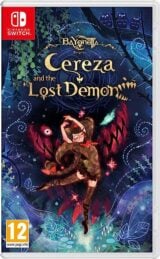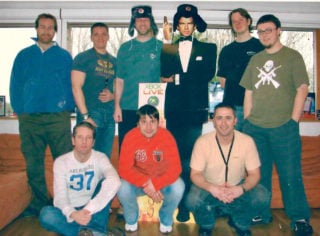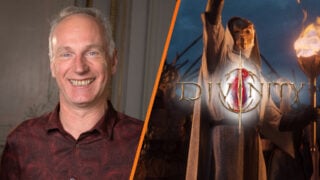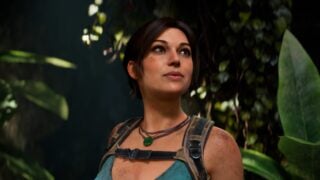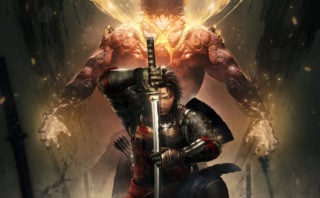Interview: Platinum on PS5, Star Wars and forgetting about Bayonetta
Hideki Kamiya and Atsushi Inaba discuss the Astral Chain studio’s plans for 2021 and beyond

PlatinumGames’ raw output may have slowed somewhat – 2018 and 2020 were rare years when it did not release a fully-original console game – but behind the scenes, the Bayonetta studio is clearly busier than ever.
This is the fourth time VGC has interviewed the Japanese developer in our short existence, and we’re never short of talking points. In the past 12 months alone, Platinum has launched a Kickstarter, revealed its first wholly-owned new IP, committed to building a new in-house game engine, and announced a new Tokyo studio focused on “live ops” games.
Its future release schedule includes the elusive Bayonetta 3 (which Kamiya says fans should “forget” about for the time being), the Kaiju superhero brawler Project G.G., Square Enix collaboration Babylon’s Fall, the aforementioned live ops project and whatever’s next for Astral Chain director Takahisa Taura.
Many of those titles have already been under construction for a significant amount of time and co-founders Atsushi Inaba and Hideki Kamiya acknowledge the frustration from fans over their silence.

However, there are hints that 2021 could finally yield some long-awaited updates on the likes of Bayonetta 3, and the studio tells VGC it would like to adopt a more community-driven approach to development in the future.
It’s yet another example of Platinum – a studio known for working on franchises owned by other companies – taking small steps towards its own independence. VGC spoke to Inaba and Kamiya over video call to get an update on its progress.
What are your plans for 2021? Kamiya recently said on an Arcade Archives stream that he expects to be busy?
Kamiya: I’m surprised that news got out! I thought that was a small stream with Hamster [Corporation] but then it blew up. That was a little bit unexpected!
But yeah, I think it’s going to be a pretty busy year for us. We really are going to start making way with Project G.G, which we announced last year. We want to start making good progress with that this year. We need to get things in motion with that, which is going to require a lot of time and dedication.
Is Project G.G. something you might update the public on as development progresses? Or should we expect a long wait until we see it again?
Inaba: I think we would really like to make this something that is more open and visible to our fans and the media. What we have at the moment, we just did a short little teaser and then it’s been a year since then. But that’s not how we always want things to be: we definitely want to have a closer interaction with our fans and so we’re hoping to get to that development style where we can share things as we move along.
Kamiya: Also, since we’re self-publishing, there are no publishers to get mad at me this time, so I’ll be sharing things online, putting up screenshots whenever I like…
Inaba: I’ll get mad at you!
We don’t have that much say over projects that we’re not publishing. And we understand different titles require different approaches, so we respect the publisher’s decisions.
So if there is a difference between what we want to do with Project G.G. versus what we normally do with our other titles, it’s not really a criticism for those publishers: we respect their approaches. But for this title especially, our approach as a company is that we’re hoping to be more open.

There seems to be a new game teaser scheduled on your ‘Platinum Four’ website. Is that related to a new project? Or is it another April Fools?
Inaba: We want to reveal it at the right time, but what we can say at the moment is that this was always intended as the ‘Platinum Four’, so I think that the expectations should be for something extra. That being said, this is something that we’ve had in the works for a while.
We wanted to get this out a little sooner but then the coronavirus happened, which I know is a common excuse, but we hope that when we can start talking about it, it will bring a smile to our fans’ faces and we’ll get a good reaction like, ‘ah, we love those Platinum guys!’
So just to set expectations, fans shouldn’t be expecting a major reveal?
Inaba: If we had to choose one end of the spectrum, then I’d probably say it’s something a little smaller in scale. But it’s still something I’m hoping fans will get a kick out of.
“There is a difference between what we want to do with Project G.G. versus what we normally do with our other titles, [but] it’s not really a criticism for those publishers: we respect their approaches.”
It’s been a year since the coronavirus really started affecting the world on a global scale. How are you coping now and has it delayed your projects?
Inaba: Currently a lot of us are working at home and it really is a case-by-case situation, depending on what your home office looks like, whether you live alone or if you have a large family, so working from home is going to feel very different for everybody.
People have to cope with it in their own way, but I also wanted to say that as a company possibly one positive we can take out of it is that there are less international barriers now: the distance feels like it’s really shrunk to me thanks to video calls like this.
I guess I try to be more optimistic about our situation as a company, and instead of just looking at the negative impact I highlight maybe the positive changes that it’s brought to the company. We’re working in a different way now and there are interesting perspectives that have come from that. I’m hoping that we can use that back in our own development.
One thing that I have felt ever since this started is how important it is for people to come together, even if it’s once or twice a week, to develop together. I don’t know if I’m a proponent of 100% remote working for development, to be honest. It’s a little tricky.

Kamiya, what’s it been like trying to create a game from scratch in this environment?
Kamiya: Regarding Project G.G., it’s my project and not yet in the phase where it really needs a core team to bring their heads together and start brainstorming. It’s not yet at that really core, ‘let’s get the gameplay together’ phase. It’s about to be – it’s getting close, and with that I’m worried because I’ve never had to deal with that in a remote situation before. I’ve always had a close team.

I do see the other teams on the floor dealing with the situation remotely and I think a lot of them are taking it pretty well, but I still have some reservations about how it might affect my own directing style.
Do you expect we’ll see an impact on the wider industry this year? 2020 games would have been close to completion when the coronavirus hit, but we’re already starting to see some 2021 titles be delayed.
Inaba: It’s obviously a tough situation. Besides just development, there are steps after production like packaging and shipping, and it’s a really easy domino effect that if just one part gets disrupted then it can cause some very bad delays – and it’s easy for that to happen.
That being said, a lot of us spend our time at home right now and I think that games have become very important to those people. So in turn, I think the games industry also wants to meet that expectation and be able to provide games to people, so I’m sure that there’s a lot more effort than we’re seeing. Will it balance out? I’m not sure. But there are definitely positive and negative impacts happening.
Kamiya: On the development of games themselves, I’ve always thought of development as an environment where people are working together side-by-side. You might glance over at the screen of the person next to you and there might be an idea that happens right in that moment.
The metaphor I’d use is that it’s like a bit of extra spice in a dish that you’re making. It’s not the core meat and potatoes of the meal, but sometimes these little interactions can produce that secret spice that can really make your meal something special. I’m worried that we might lose some of that with remote working.
Last year you opened a new studio in Tokyo to work on an original IP. How is that progressing?
Inaba: One thing we can say is that it’s opened a lot of possibilities for new hires in the company. I think we’ve had a lot of success in that area so far, which I’m happy about. We’re even seeing people that I don’t think we would’ve gotten if we were just hiring in Osaka. It’s a new crowd of people.
Part of the attraction is that we are now working on our own engine at the same time, so we had people interested in that join. At the moment, it feels that it’s coming at a really good pace. I feel like the studio’s going to be full in no time and that’s something that I’m very happy about.

There have been reports in both the Japanese and Western business media that PlayStation has reduced its support for the Japanese market. Is that what you’re seeing? And do you think it’s justified considering the historically shrinking console market in Japan?
Inaba: To be honest, we don’t feel it that much, or at least I haven’t felt the impact of it myself yet. That being said, I do understand that the console industry in Japan is not what it used to be and when that happens the priorities of these big console makers will change, and that makes perfect sense to me.
I don’t know if this is an opinion that’s out there, and I don’t have any personal investment, but just because PlayStation is from Japan doesn’t mean it should focus on the Japanese market. I don’t feel that way. At the same time, I don’t think it’s American now either: I think it’s international and doesn’t really belong to any country. That’s how I feel as a developer.
However, I understand from a user perspective that if we start seeing release schedules prioritising the US over Japan, then that will be frustrating I’m sure. I’m not going to tell Japanese fans, ‘that’s how it is, deal with it’.
“Just because PlayStation is from Japan doesn’t mean it should focus on the Japanese market. I don’t feel that way. At the same time, I don’t think it’s American now either: I think it’s international and doesn’t really belong to any country.”
Kamiya: Maybe you’re aware that up until PS4 the default confirm button in Japan has always been circle, where as it was always X in the US. But for PS5, Sony has unified this and made X the default select button in Japan like the US.
To me this doesn’t feel like a Japan versus US thing – my pride isn’t hurt as a Japanese person – it’s just more that there are two camps who had two ways of doing things, and I think they’ve short-sightedly leaned one way. I don’t understand the reasoning behind that.
We thought you would have strong feelings about that… it was literally our next question.
Kamiya: (Laughs) To clarify, if it had been the opposite way around and they had made the world use circle for select, I think I would’ve felt the same way. It’s just a little bit of disrespect towards the gaming cultures that have existed for decades now as part of so many peoples’ lives. I feel like PS5 has disrupted that and I don’t know if it was meaningful to do that.
Do you think the focus shift to the West could make the platform less attractive to the many Japanese creators who’ve been associated with it?
Kamiya: Like I said, to me it’s not a Japan versus the US situation, but more about ‘culture A’ and ‘culture B’. One was chosen over the other, but I don’t think that means Japan is going to break away – I don’t see that. I don’t see a shunning of Sony from the Japanese makers at all. And really it’s so hard to get a PS5 right now that I feel we don’t have enough accurate data on how it will ultimately fare in Japan yet.

Kamiya, here’s the inevitable Bayonetta 3 question: You were recently quoted as saying you’d like to provide a public update on the game this year. Is that right?
Kamiya: It’s not really our position to say, but… it’s January. We’ve got to have something come out, right? I guess it’s safe to expect that something will come out. There’s still a lot of the year left is what I’m saying.
By “update”, do you mean something more substantial than another CGI logo?
Kamiya: (Laughs) I understand it’s driving the fans crazy! In light of that, my suggestion would be that maybe we should all reset and forget about Bayonetta 3. Then when something finally does happen, it will be a nice surprise, won’t it?

Inaba: As far as Platinum is concerned, Taura is the best director at the company. Kamiya is probably the fifth best director at the company currently – he needs to get a game out and work his way back in again (laughs).
Taura is young and full of promise still, right? It feels like he has lots of ideas, lots of things that he likes and wants to try out and there’s a lot that we want him to do. It could be him wanting to do his own thing, something like Astral Chain again, or it could be somebody coming to us and saying, ‘we really like Taura and we want to do something with him’ like what we did with Nier. So there are a lot of ways his career could take off.
On the subject of Astral Chain, forum sleuths noticed that your website recently removed reference to Platinum from the game’s copyright, leaving just Nintendo. Should we read anything into that?
Inaba: It’s as it looks.
To clarify, a similar copyright change for The Wonderful 101 led to Nintendo handing over the IP to Platinum. Does this mean Nintendo now owns Astral Chain?
Inaba: It’s as it is written on the website: Astral Chain is their IP and as such there are limitations on how much we feel we should talk about.
[Editor’s note: When asked for clarification on Inaba’s comments regarding the Astral Chain IP ownership, a PlatinumGames spokesperson said the company was “not in a position to answer this question”.]
Kamiya, Shinji Mikami – your old mentor – recently said he believes game designers peak in their 30s and then run out of energy. What’s your take on that?
Kamiya: I understand what Mikami is trying to say, to be honest. Looking at my own career, I was 30 when I worked on Devil May Cry, I was 33 when I worked on Viewtiful Joe and then Okami came shortly after. So that was a very dense part of my career, which I do owe to Mikami-san, and I’m very grateful for the opportunities he gave me.
Thinking about Taura-san in the same way, games are on a much bigger scale than they were in my 30s and so it’s not as easy to give everybody a chance, but we still try to where we can. As Inaba said, we still have big expectations for Taura and we hope that he will work on some good titles here moving forward.
Inaba-san, Wonderful 101 was your first publishing project. Now that we’re nearly a year on, how would you assess its successes and negatives?
Inaba: When we were really in the thick of it, it was all so new, and we just didn’t know right from left. There were so many things that we had to learn and there wasn’t even time to second guess ourselves in any situation, we just had to keep moving forward and get it out there somehow.

That involved a good deal of stress of course, but it taught us so much. I’m really glad that we did it and had that experience that we can now use when we publish titles moving forward. Also, I should say we wanted to up our efforts in the marketing of the title so we tried the Kickstarter, but doing that at the same time as publishing our first game was a real double-whammy for the company.
It was a crazy period for us but we got through it and definitely feel better now. We really just wanted to make The Wonderful 101 available to the fans again and above all, I’m really glad that we were able to do that.
Lucasfilm recently signalled that it’s making the Star Wars license available to new game developers again. Have you already put your pitch in?
Kamiya: I’m glad you brought this up because I just bought the full Blu-ray boxset and I’ve been watching all the movies over the past few weeks. I’ve just got to Episode 9 and I’m going to watch it right after this interview!
Inaba: 9? Why watch the last trilogy?
Kamiya: I love 9!
Regarding working on a Star Wars game though… it’s a very well devised world. There’s just so much depth and character in that world that it’s almost terrifying to have to be in control of it for a game. I’d have my ideas for what I’d want to do for a game, but do those fit with the Star Wars franchise?
For PlatinumGames we could think, ‘we have a lightsaber, we slice at some guy and he goes flying, we do a mid-air combo and then pull out a whip lightsaber and start getting at ‘em’, but what if the powers that be say, ‘you can’t do that with Star Wars’? That would be trying at times, possibly. So when we hear that it’s available, part of me is like, ‘gimme gimme gimme!’ But then part of me is also like, I don’t want to get tangled up in something that could get messy.
What do you think, Inaba?
Inaba: You mean about episodes 7, 8 and 9?
Kamiya: No, about us doing a Star Wars game!
Inaba: Honestly, I feel the same way. It does feel attractive to be able to work on it and it’d be a dream in some ways. But I also feel like we would just make the fans pissed if we worked on it. Star Wars has such a fully developed world I feel it might be hard for us to add something. I think fans would be angry at what we would do, so it’s a difficult proposition.
But you’d take the call?
Inaba: We’re not in a position to be turning down meetings with Disney! (laughs) We’re not that elite yet. We would be honoured to have a meeting with them, yes.





